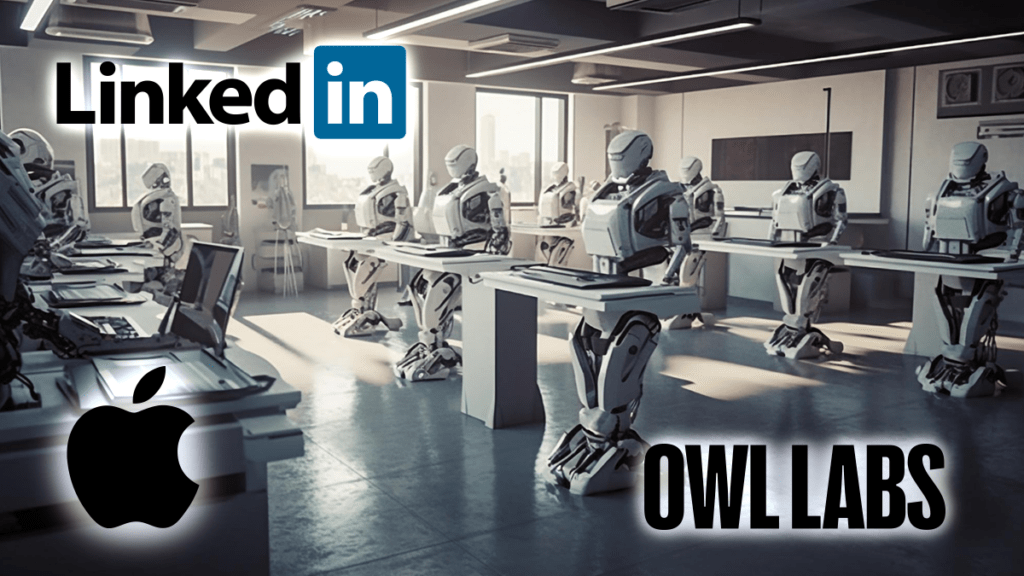As AI gains traction in global tech firms like LinkedIn and Apple, uncertainty and ‘AI anxiety’ swell among workers, according to Owl Labs’ annual State of Hybrid Work Report.
The study found that 32% of employees believe AI will boost job efficiency, 22% see an opportunity for job creation, but 17% fear job loss. The generational divide in AI perception also emerges, with Gen Z viewing AI positively, while older demographics remain sceptical. The report emphasises the need for clear communication about AI implementation to ease employee worries.
- 32% of employees believe that AI will help them do their jobs more efficiently.
- Nearly 1 in 5 UK workers (17%) are concerned that AI will steal their jobs.
- More than 1 in 4 UK workers (27%) want improved video conferencing tools, and 26% want to use AR or mixed reality devices at work.
The AI Conundrum: Friend or Foe in the Workplace?
Artificial intelligence (AI) is a hot topic these days, especially when it comes to its role in the workplace. As major tech giants such as LinkedIn and Apple continue to integrate AI into their operations, it’s sparking a debate: Will AI enhance or disrupt the work environment?
According to the annual State of Hybrid Work Report by Owl Labs, there’s a mixed bag of opinions. While 32% of workers believe AI will boost their job efficiency, another 22% reckon it will lead to job creation and team growth. On the flip side, there’s a growing fear, or ‘AI anxiety’, among UK workers with 17% worried about AI ‘stealing’ their jobs.
CEO’s Take on AI in the Workplace
Frank Weishaupt, CEO of Owl Labs, weighed in on the discussion. He noted the immense potential AI brings to the corporate world, but also emphasised the need for discretion when implementing AI tools. In his words:
“The meteoric rise of ChatGPT has propelled AI tools into a new stratosphere, prompting many businesses to understand how they can use AI to make their operations more efficient or build stronger products. IT leaders must exercise discretion when implementing AI tools, ensuring innovation serves a purpose and allows for current employees’ workload to be streamlined. Clearly communicating company guidelines around the use of AI is essential to building employee trust and reassuring their ‘AI anxiety’.”
The Generation Gap in AI Perception
Interestingly, attitudes towards AI in the workplace seem to split along generational lines. Younger Gen Z workers (16-24 years old) are more optimistic about AI’s potential to enhance their work and create new roles. However, they also shoulder more ‘AI anxiety’, with 21% fearing that AI could render their jobs obsolete.
Tech Expectations: Beyond AI
The report also sheds light on the broader tech expectations of UK workers. A significant 72% agree that good tech is crucial for a successful work life. Many are eager for enhanced video conferencing tools (27%) and AR or mixed reality devices (26%) at work. Yet, only a quarter of companies have updated their meeting technology in the past year, despite 82% of employees experiencing lost meeting time due to tech hitches.
Final Thoughts
The findings from Owl Labs’ report reveal a fascinating dichotomy – a workforce excited by the potential of AI and tech, yet also anxious about its implications. It’s clear that companies need to tread carefully, balancing innovation with clear communication and empathy towards employees’ anxieties. Furthermore, the tech gap highlighted by the report underscores the pressing need for companies to invest in reliable, up-to-date technology. After all, a well-equipped and confident workforce is a productive one.
Ultimately, the future of AI in the workplace is still unfolding. What is certain, however, is that the conversation around it is one we need to keep having.
FAQ
Q: What percentage of employees believe that AI will help them do their jobs more efficiently?
A: According to Owl Labs’ annual State of Hybrid Work Report, 32% of employees believe that AI will help them do their jobs more efficiently.
Q: What percentage of employees think AI will create new jobs allowing their teams to grow?
A: A further 22% think AI will create new jobs allowing their teams to grow.
Q: How many UK workers are concerned that AI will steal their jobs?
A: Nearly 1 in 5 UK workers (17%) are concerned that AI will steal their jobs.
Q: What percentage of UK workers are worried that AI has the potential to create new ethical issues in the workplace?
A: A further 19% are worried that AI has the potential to create new ethical issues in the workplace.
Q: What is the perspective of Gen Z workers (16-24 years old) towards AI?
A: Gen Z workers are most likely to think AI will help them do their job more effectively (37%) and create new roles (29%).
Q: Which age group is least likely to see the benefits of using AI?
A: Those aged 55 and over are least likely to see the benefits of using AI.
Q: What percentage of 16-24-year-olds are worried that AI will take their jobs?
A: Over a fifth (21%) of 16-24-year-olds are worried that AI will take their jobs.
Q: What percentage of UK workers want improved video conferencing tools?
A: More than 1 in 4 UK workers (27%) want to see improved video conferencing tools.
Q: What percentage of UK workers want to use AR or mixed reality devices at work?
A: A further 26% want to use AR or mixed reality devices at work.
Q: How many companies have updated their meeting technology in the past year?
A: Only a quarter (25%) of companies have updated their meeting technology in the past year.
Q: What percentage of employees have lost meeting time due to tech difficulties?
A: 82% of employees report that they have lost meeting time due to tech difficulties.
image copyright: https://claudeai.uk/
